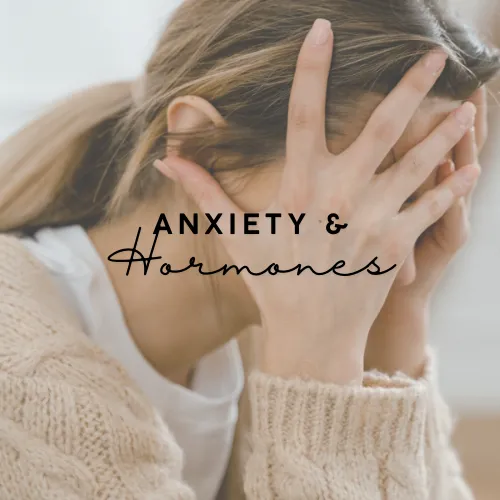
Anxiety and Hormones
Anxiety and Your Hormones
Anxiety is an umbrella term that covers a wide range of experiences—worry, fear, apprehension, and nervousness. These feelings don’t just live in the mind; they often show up in the body, too. Shortness of breath, dizziness, nausea, and stomach aches are just some of the physical symptoms that anxiety can bring.
Experts agree that anxiety can stem from many sources: stress, lack of sleep, trauma, substance use, genetics, medical conditions—and yes, hormones. In this article, we’ll focus specifically on how hormonal shifts, particularly in women, can influence anxiety levels.
Difficulty of Tracing the Cause
It’s important to note that while hormones are often linked to anxiety, pinpointing the exact cause is rarely straightforward. Self-diagnosis can be misleading, and more often than not, a medical professional is needed to uncover the root cause. Even if hormones play a role, they’re rarely the only factor. Symptoms often overlap with other health issues, which makes a thorough evaluation essential.

Hormonal Imbalances That Can Trigger Anxiety
If you’ve ever noticed that your anxiety spikes during certain times—like right before your period, during pregnancy, or when your thyroid isn’t functioning properly—you’re not imagining it. Hormones are powerful messengers in the body, and when they fluctuate, your mood and mental well-being can shift right along with them.
Let’s look at some of the most common hormonal changes that can trigger or worsen anxiety.
Menstrual Cycle & Anxiety
Many women notice mood changes before or during their period. That’s because estrogen and progesterone levels rise and fall during the menstrual cycle, which impacts energy, sleep, digestion, and even appetite. These shifts can alter mood and, for some women, fuel feelings of anxiety. Add in physical discomfort like cramps and fatigue, and it’s easy to see why this time of the month can feel especially overwhelming.
Pregnancy & Hormonal Changes
Pregnancy is a season of profound hormonal shifts. While it’s often filled with excitement and anticipation, it can also bring heightened anxiety. Surging hormones, physical changes, and the natural worries of preparing for birth can lead to irritability, panic attacks, or restlessness. These feelings are common, but they can still feel overwhelming in the moment.
Thyroid Imbalances
Your thyroid regulates much more than metabolism—it also influences mood and mental health. An overactive thyroid can cause symptoms like rapid heartbeat, hyperventilation, and restlessness, which mimic or amplify anxiety. On the other hand, an underactive thyroid can slow brain activity, sometimes leading to worry, low mood, or anxious feelings.
The Gray Area
While hormonal imbalances and anxiety are linked, hormones alone don’t tell the full story. Many experts believe hormones don’t directly cause anxiety but instead intensify it. Stress, environment, and personal history all play a role, which is why no two women experience anxiety in exactly the same way.
Finding Relief
If you think your hormones might be affecting your mental health, the first step is reaching out to a healthcare professional for guidance. From there, you can explore lifestyle shifts and treatment options that fit your unique needs.
In the meantime, here are some supportive steps you can take:
Prioritize quality sleep – Rest is key for hormone regulation and nervous system balance.
Move your body regularly – Exercise reduces stress and boosts mood-regulating chemicals.
Nourish yourself with whole foods – Stable blood sugar supports both hormonal and emotional balance.
Seek professional care – If medication or hormone therapy is recommended, always follow a doctor’s guidance rather than self-prescribing.
The bottom line: Hormones and anxiety are deeply connected, but they don’t define you. By understanding the role your hormones play and seeking the right support, you can regain balance and feel more in control of your well-being.